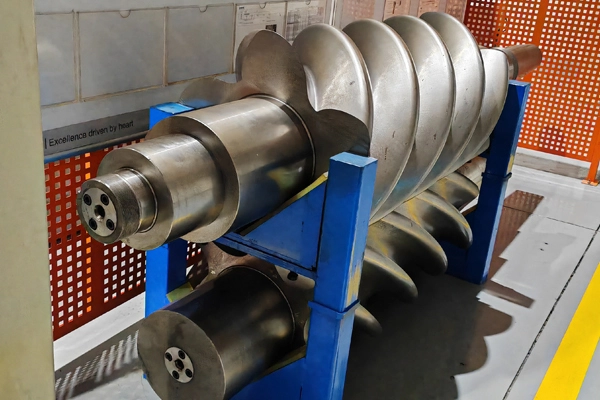Choosing the right material for forging large-diameter screw rotors (e.g., diameter 580mm) is essential for ensuring optimal performance, durability, and reliability. Below are some recommended materials, their properties, and explanations of their advantages:
1. 42CrMo4 (AISI 4140) - Chromium-Molybdenum Steel
Advantages:
High Strength and Toughness: Offers excellent tensile and yield strength, making it suitable for high-stress environments.
Wear Resistance: The chromium and molybdenum content enhances resistance to abrasion and wear.
Good Machinability: It is relatively easy to machine after heat treatment.
Heat Treatability: Can be quenched and tempered to achieve desired mechanical properties, like hardness and toughness.
Cost-Effective: Commonly available and economical for large-scale production.
Applications: Ideal for screw rotors used in compressors or blowers where high stress and wear resistance are critical.
2. 17CrNiMo6 (AISI 9310) - Nickel-Chromium-Molybdenum Steel
Advantages:
Excellent Hardness and Toughness Combination: Offers superior core toughness and surface hardness after carburizing.
Fatigue Resistance: High resistance to fatigue, making it suitable for components subjected to cyclic loading.
Wear Resistance: The carburized layer provides a hard and wear-resistant surface.
Dimensional Stability: Maintains stability after heat treatment, crucial for precision rotors.
Applications: Used in high-performance applications requiring excellent surface hardness and long service life.
3. ASTM A182 F22 (Low Alloy Steel)
Advantages:
High-Temperature Performance: Performs well in environments with elevated temperatures.
Corrosion Resistance: The chromium content enhances resistance to corrosion in moderate environments.
Good Toughness: Withstands impact and shock loading.
Durability: Suitable for heavy-duty applications where reliability is key.
Applications: Suitable for screw rotors operating under high-temperature and moderate-corrosion conditions, such as in steam turbines.
4. Stainless Steel Alloys (e.g., 17-4PH, 316L)
Advantages:
Corrosion Resistance: Particularly useful in aggressive environments or where moisture is a factor.
High Strength: Some grades like 17-4PH offer excellent strength after precipitation hardening.
Surface Finish: Superior surface quality can be achieved, important for sealing surfaces.
Low Maintenance: Resists rust and chemical attack, reducing maintenance needs.
Applications: Best for applications involving corrosive or hygienic conditions, such as in food-grade or chemical industries.
5. EN8 (AISI 1040/1045) - Medium Carbon Steel
Advantages:
Cost-Effective: More affordable than alloy steels, suitable for less demanding applications.
Good Strength: Sufficient tensile strength for moderate loads.
Ease of Machining: Can be easily machined and treated to improve surface properties.
Applications: Suitable for low to medium-stress applications where cost is a priority.
6. Nitriding Steel (e.g., 34CrAlNi7-10)
Advantages:
High Surface Hardness: Achieves excellent wear resistance through nitriding.
Dimensional Stability: Minimal distortion during heat treatment.
Fatigue Resistance: Strong performance under cyclic stresses.
Corrosion Resistance: Improved surface properties compared to traditional steels.
Applications: Preferred for high-performance screw rotors requiring superior wear and fatigue resistance.
Material Selection Considerations:
Load Conditions: High-strength alloys (e.g., 42CrMo4) are suitable for heavy loads and high stress.
Corrosion Environment: Use stainless steel (e.g., 316L) in corrosive environments.
Heat Treatment Needs: Materials like 17CrNiMo6 are ideal for carburizing, while 42CrMo4 can be tempered.
Operating Temperature: Consider low alloy steels (e.g., ASTM A182 F22) for high-temperature applications.
Cost vs. Performance: Medium-carbon steels like EN8 are cost-effective but less durable than alloy steels.
Insights
Forging Process: Forged materials generally have superior mechanical properties (e.g., higher fatigue strength, grain flow alignment) compared to cast materials.
Heat Treatment: Tailored heat treatment processes (e.g., quenching, tempering, nitriding) significantly enhance mechanical properties and lifespan.
Precision Machining: Materials must be compatible with CNC machining for achieving tight tolerances and optimal surface finishes required in screw rotors.
By understanding the specific requirements of your application, you can select the most appropriate material to balance performance, cost, and longevity. Leveraging advanced technology and a skilled workforce, as one of the professional and reliable alloy steel forging manufacturers, Walkson specializes in forging that adheres to the stringent standards of various industries.
 English
English  Deutsch
Deutsch  français
français  русский
русский  فارسی
فارسی  العربية
العربية  Español
Español  日本語
日本語  한국어
한국어  italiano
italiano  português
português  dansk
dansk  Suomi
Suomi 





